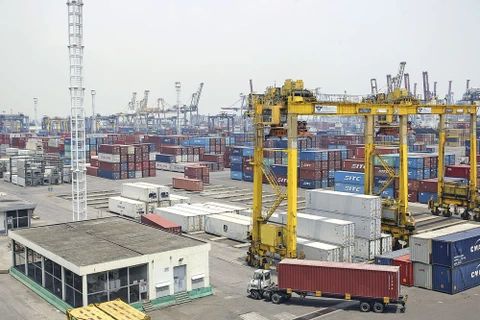Jakarta (VNA) – Indonesia’s foreign debts rose to about 409.7 billion USD in July from 408.6 billion USD in June, according to the country’s central bank (BI).
Debts of the public sector and private sector were 201.8 billion USD and 207.9 billion USD respectively.
However, BI spokesperson Onny Widjanarko said that the growth of foreign debts in July 2020 at 4.1 percent year-on-year was still slower than the 5.1 percent in the previous month due to the declining growth of private foreign debt amid the relatively stable growth of the government's foreign debt.
He said that the government debts rose 2.3 percent in July to 199 billion USD.
This condition was due to the withdrawal of commitments from several multilateral institutions and the issuance of Samurai bonds to meet the financing needs including those for the COVID-19 pandemic mitigation and the national economic recovery programme.
However, the structure of Indonesia's foreign debts remained healthy as they were managed prudently with the debt to gross domestic product (GDP) ratio reaching 38.2 percent, Widjanarko said.
The structure of the Indonesian foreign debts remains dominated by long-term debts (89.1 percent of the total foreign debts), he noted.
In efforts to maintain the healthy foreign debt structure, Bank Indonesia and the government continue to enhance coordination in monitoring the debt development which is supported by the prudent debt management./.
Debts of the public sector and private sector were 201.8 billion USD and 207.9 billion USD respectively.
However, BI spokesperson Onny Widjanarko said that the growth of foreign debts in July 2020 at 4.1 percent year-on-year was still slower than the 5.1 percent in the previous month due to the declining growth of private foreign debt amid the relatively stable growth of the government's foreign debt.
He said that the government debts rose 2.3 percent in July to 199 billion USD.
This condition was due to the withdrawal of commitments from several multilateral institutions and the issuance of Samurai bonds to meet the financing needs including those for the COVID-19 pandemic mitigation and the national economic recovery programme.
However, the structure of Indonesia's foreign debts remained healthy as they were managed prudently with the debt to gross domestic product (GDP) ratio reaching 38.2 percent, Widjanarko said.
The structure of the Indonesian foreign debts remains dominated by long-term debts (89.1 percent of the total foreign debts), he noted.
In efforts to maintain the healthy foreign debt structure, Bank Indonesia and the government continue to enhance coordination in monitoring the debt development which is supported by the prudent debt management./.
VNA






















